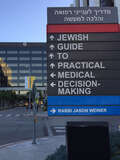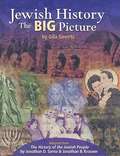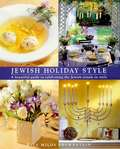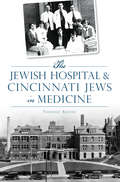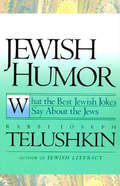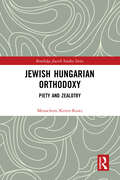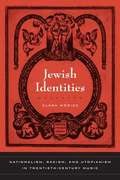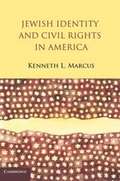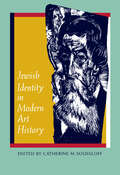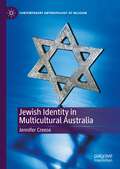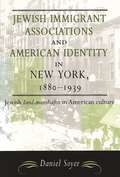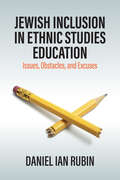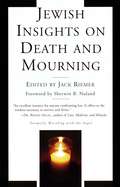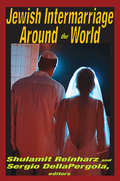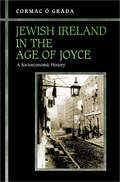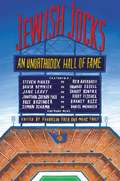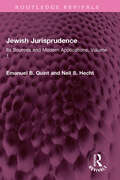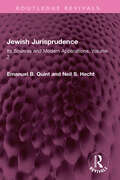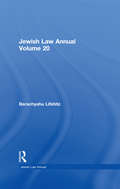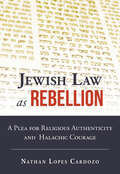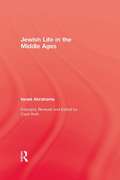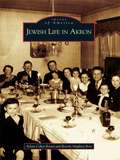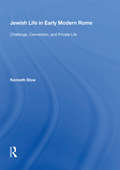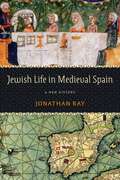- Table View
- List View
Jewish Guide to Practical Medical Decision-Making
by Jason WeinerDue to the rapid advances in the medical field, existing books on Jewish medical ethics are quickly becoming outdated and irrelevant. Jewish Guide to Practical Medical Decision-Making seeks to remedy that by presenting the most contemporary medical information and rabbinic rulings in an accessible, user-friendly manner. Rabbi Weiner addresses a broad range of medical circumstances such as surrogacy and egg donation, assisted suicide, and end of life decision making. Based on his extensive training and practical familiarity inside a major hospital, Rabbi Weiner provides clear and concise guidance to facilitate complex decision-making for the most common medical dilemmas that arise in contemporary society.
Jewish History: The Big Picture
by Gila Gevirtz Jonathan B. KrasnerThis lively and accessible volume presents the full range of Jewish history, from biblical to contemporary times. Adapted from the two-volume award-winning work, The History of the Jewish People by Professors Jonathan Sarna and Jonathan Krasner, this single volume treats readers to a fast-paced account of Jewish history that is grounded in scholarship and brimming with information on topics as diverse as the development of Christianity beyond its Jewish roots into a new religion and the revival of Hebrew as a spoken language. The text is filled with colorful anecdotal detail about Jewish communities throughout history and around the world, such as how Passover was celebrated on the Civil War battlefield and the origins of Beta Israel, the Ethiopian-Jewish community.
Jewish Holiday Style
by Rita Milos BrownsteinAt last -- the Jewish holidays transformed into exquisite celebrations, graced with sublime chic and elegant ease for the contemporary Jewish reader. Combining the flair of Martha Stewart with the warmth and accessibility of a delightful neighbor, Rita Milos Brownstein breathes new life into traditional Jewish holiday celebrations. Entertaining in high style creates marvelous holiday memories for your family, your friends, and yourself. For each of the ten major holidays, Brownstein offers suggestions for creative projects that will bring the whole family together and mouth-watering menus that make it effortless to prepare festivities of true material and spiritual splendor. With more than 85 full-color photographs and easy-to-follow step-by-step illustrations, this captivating book will motivate you to explore your Jewish heritage and use your imagination to make it your own. Jewish Holiday Style is packed with dazzling and inspiring ideas. For Rosh Hashanah, host a honey-tasting party to celebrate the sweetness of a new year. If you love the ocean, observe Sukkot in a sukkah with a seaside motif -- even if you live in the cornfields of the Midwest. Make your own Chanukah menorahs -- try a simple cruse of oil that reflects the miracle of the oil in the Holy Temple, or an elaborate metalworked candelabra that is sure to become a family heirloom. For the Passover table, create personalized pillows for your guests, which.will allow them to recline like the royalty of old while you serve a lavish yet simple-to-prepare feast. As part of this eye-opening tour through the Jewish calendar, Brownstein also highlights the historical origins and religious importance of each major holiday with a delightful essay that brings ancient rituals into the modern day. Think of the fast of Yom Kippur, for instance, as "a day spa for the soul...the too rare opportunity to get in touch with the things that really matter." Purim is "the definitive holiday of joy and merriment," commemorating a bright moment in the often somber history of the Jewish people. On Shabbat, "appreciate that you are joining the wave of Jews who are kindling their candles as the sun falls, working its way around the world." At once a handbook of creative ideas and a primer on the spiritual significance of the Jewish holidays, Jewish Holiday Style is the first lifestyle book to address these all-important rituals and ceremonies, an elegantly designed volume that blends sensational crafts and delectable cooking with the richness of Judaism's 3,300-year-old tradition. Bursting with fresh ideas and exciting new looks, here, finally, is the book you've been waiting for. Let the holiday celebrations begin!
Jewish Hospital & Cincinnati Jews in Medicine, The (American Heritage)
by Frederic KromeCincinnati Jewish Hospital has remained a beacon of service to the city for more than a century and a half. Although it always accepted patients regardless of their heritage or faith, the institution maintains its Jewish identity. Founded in 1850, the Hospital weathered depressions and wars while reflecting changes that occurred within the Jewish community and the city. Cincinnati's Jewish health professionals pioneered medical education, new treatments for polio and the introduction of new psychological treatments for children. Author Frederic Krome explores the fascinating history of the Cincinnati Jewish Hospital and the many contributions Cincinnati Jews made to the field of medicine.
Jewish Humor
by Joseph TelushkinHere are more than 100 of the best Jewish jokes you'll ever hear, interspersed with perceptive and persuasive insight into what they can tell us about how Jews see themselves, their families, and their friends, and what they think about money, sex, and success. Rabbi Joseph Telushkin is as celebrated for his wit as for his scholarship, and in this immensely entertaining book, he displays both in equal measure. Stimulating, something stinging, and always very, very funny, Jewish Humor offers a classic portrait of the Jewish collective unconscious.
Jewish Hungarian Orthodoxy: Piety and Zealotry (Routledge Jewish Studies Series)
by Menachem Keren-KratzBeginning with the informal establishment of Jewish Orthodoxy by a Hungarian rabbi in the early nineteenth century, this book traces the history and legacy of Jewish Hungarian Orthodoxy over the course of the last 200 years. To date, no single book has provided a comprehensive overview of the history of Hungarian Orthodoxy, a singularly zealous, fundamental, and separatist faction within Jewish circles. This book describes and explains the impact of this strand of Jewish Orthodoxy – developed in Hungary in the second half of the nineteenth century – across the Jewish world. The author traces the development of Hungarian Orthodoxy in the “new” Jewish territories created in the wake of Hungary’s dismantlement following its defeat in World War I. The book also focuses on Hungarian Orthodoxy in the two spheres where it continued to develop after the Holocaust, namely Israel and the United States. The book concludes with a review of Hungarian Orthodoxy’s legacy in contemporary communities worldwide, most of which are known for their radical anti-Zionist and anti-modernistic strands. The book will prove vital reading for students and academics interested in religious fundamentalism, Hungarian history, and Jewish studies generally.
Jewish Identities: Nationalism, Racism, and Utopianism in Twentieth-Century Music
by Klara MoriczKlara Moricz scrutinizes concepts of Jewish identity and reorders ideas about twentieth-century "Jewish music" in three case studies: first, Russian Jewish composers of the first two decades of the twentieth century; second, the Swiss American Ernest Bloch; and third, Arnold Schoenberg.
Jewish Identity and Civil Rights in America
by Kenneth L. MarcusGiven jurisdiction over race and national origin but not religion, federal agents have had to determine whether Jewish Americans constitute a race or national origin group. They have been unable to do so. This has led to enforcement paralysis, as well as explosive internal confrontations and recriminations within the federal government. This book examines the legal and policy issues behind the ambiguity involved with civil rights protections for Jewish students. Written by a former senior government official, this book reveals the extent of this problem and presents a workable legal solution.
Jewish Identity in Modern Art History
by Catherine M. SoussloffIn the first comprehensive study of Jewish identity and its meaning for the history of art, eleven influential scholars illuminate the formative role of Jews as subjects of art historical discourse. At the same time, these essays introduce to art history an understanding of the place of cultural identity in the production of scholarship.Contributors explore the meaning of Jewishness to writers and artists alike through such topics as exile, iconoclasm, and anti-Semitism. Included are essays on Anselm Kiefer and Theodor Adorno; the effects of the Enlightenment; the rise of the nation-state; Nazi policies on art history; the criticism of Meyer Schapiro, Clement Greenberg, and Aby Warburg; the art of Judy Chicago, Eleanor Antin, and Morris Gottlieb; and Jewish patronage of German Expressionist art.Offering a new approach to the history of art in which the cultural identities of the makers and interpreters play a constitutive role, this collection begins an important and overdue dialogue that will have a significant impact on the fields of art history, Jewish studies, and cultural studies.
Jewish Identity in Multicultural Australia (Contemporary Anthropology of Religion)
by Jennifer CreeseThis book offers a timely insight into ideas of ‘belonging’ in multicultural society from a Jewish perspective, one which is largely missing from the discourse on multiculturalism. There is a current climate in Australia, as there is in the United States, Europe and elsewhere, of rising tensions around migration, religious freedom, and far right extremism. These tensions have been fanned the Israeli-Palestine conflict coming under increased international scrutiny in recent months. Understanding how Jewish communities attempt to build and guide an understanding of what Jewishness means in contemporary multicultural societies is crucial for supporting the right to safety in diversity, not only for Jews but for multiple minority groups. In delivering such understanding, this book has insights not only in an Australian, but a broader international, context.This book explores how various facets of Jewish life are experienced and expressed in Australia, drawing on rich ethnographic and archival research conducted within the mid-sized Jewish community in South-East Queensland, Australia, which has never before been examined. Jewish Identity in Multicultural Australia explores how Jewish identity is manifested and experienced across a wide range of facets: religion and religiosity, ethnicity and ethnonational identity, history and memory, antisemitism and racism, Zionism and diasporic identity, and family and kinship. Across these key themes, the book builds on a core argument: that contemporary Jewish communities work in certain, set ways and promote certain, set norms within a framework of state multiculturalism to forge a safe, supported place for Jewish life, practice and identity of all shapes and sizes.
Jewish Immigrant Associations and American Identity in New York, 1880-1939: Jewish Landsmanshaftn in American Culture (American Jewish Civilization Series)
by Daniel SoyerLandsmanshaftn, associations of immigrants from the same hometown, became the most popular form of organization among Eastern European Jewish immigrants to the United States in the late 19th and early 20th centuries. Jewish Immigrant Associations and American Identity in New York, 1880-1939, by Daniel Soyer, holds an in-depth discussion on the importance of these hometown societies that provided members with valuable material benefits and served as arenas for formal and informal social interaction. In addition to discussing both continuity and transformation as features of the immigrant experience, this approach recognizes that ethnic identity is a socially constructed and malleable phenomenon. Soyer explores this process of construction by raising more specific questions about what immigrants themselves have meant by Americanization and how their hometown associations played an important part in the process.
Jewish Inclusion in Ethnic Studies Education: Issues, Obstacles, and Excuses
by Daniel Ian Rubin RubinThe function of ethnic studies education in K-12 schools remains a deeply contentious issue within the U.S. Often based on university ethnic studies courses, its focus on the lived experiences of Black, Latino, Indigenous, and Asian/Pacific Islander communities is predictably the target of much conservative commentary, leaving its disregard for the lives of American Jews underexplored. Focusing on how this absence correlates with the rising spate of antisemitism within the U.S., Jewish Inclusion in Ethnic Studies Education provides a clarifying re-examination of the current issues and oversights affecting ethnic studies teaching. In doing so, Daniel Ian Rubin illuminates the possibilities a reformed ethnic studies program offers for eliminating antisemitism among the next generation.
Jewish Insights on Death and Mourning
by Jack RiemerThis collection of Jewish reflections on issues of death and dying make this an indispensable resource for coping with some of life's most difficult moments.
Jewish Intermarriage Around the World
by Sergio DellaPergolaMost research on intermarriage between Jews and non-Jews focuses on the United States. This volume takes a path-breaking approach, examining countries with smaller Jewish populations so as to better understand countries with larger Jewish populations. It focuses on intermarriage in Great Britain, France, Scandinavia, the Soviet Union, Mexico, Venezuela, Canada, South Africa, Australia, Argentina and Curacao, then applies the findings to the United States.In earlier centuries such a volume might have yielded much diff erent conclusions. Then Jews lived in more countries, intermarriage was not as prevalent, and social science had little to contribute. Before World War II, the Jewish population was dispersed much diff erently, and it continues to shift around the world because of both push and pull factors. Like demography, intermarriage is a dynamic process. What is true today was probably not true in the past, nor will it be true tomorrow.The contributors to this volume locate new forms of Jewish family life—single parents, gay/lesbian parents, adults without children, and couples with multiple backgrounds. These multiple family forms raise a new question—what is a Jewish family—as well as a variety of related issues. Do women and men have diff erent roles in intermarriage? Does a family need two people to raise children? Should there be patrilineal descent? Where do adoption, single parenting, lesbian and gay identities, and more, fit into the picture? Broadly, what role does the family play in transmitting a group's culture from generation to generation? This volume presents a portrait of Jewish demography in the twenty-first century, brilliantly interweaving global processes with significant local variations.
Jewish Ireland in the Age of Joyce: A Socioeconomic History
by Cormac Ó GrádaJames Joyce's Leopold Bloom--the atheistic Everyman of Ulysses, son of a Hungarian Jewish father and an Irish Protestant mother--may have turned the world's literary eyes on Dublin, but those who look to him for history should think again. He could hardly have been a product of the city's bona fide Jewish community, where intermarriage with outsiders was rare and piety was pronounced. In Jewish Ireland in the Age of Joyce, a leading economic historian tells the real story of how Jewish Ireland--and Dublin's Little Jerusalem in particular--made ends meet from the 1870s, when the first Lithuanian Jewish immigrants landed in Dublin, to the late 1940s, just before the community began its dramatic decline. In 1866--the year Bloom was born--Dublin's Jewish population hardly existed, and on the eve of World War I it numbered barely three thousand. But this small group of people quickly found an economic niche in an era of depression, and developed a surprisingly vibrant web of institutions. In a richly detailed, elegantly written blend of historical, economic, and demographic analysis, Cormac Ó Gráda examines the challenges this community faced. He asks how its patterns of child rearing, schooling, and cultural and religious behavior influenced its marital, fertility, and infant-mortality rates. He argues that the community's small size shaped its occupational profile and influenced its acculturation; it also compromised its viability in the long run. Jewish Ireland in the Age of Joyce presents a fascinating portrait of a group of people in an unlikely location who, though small in number, comprised Ireland's most resilient immigrant community until the Celtic Tiger's immigration surge of the 1990s.
Jewish Jocks: An Unorthodox Hall of Fame
by Franklin Foer Marc TracyJEWISH JOCKS: AN UNORTHODOX HALL OF FAME is a timeless collection of biographical musings, sociological riffs about assimilation, first-person reflections, and, above all, great writing on some of the most influential and unexpected pioneers in the world of sports. Featuring work by today's preeminent writers, these essays explore significant Jewish athletes, coaches, broadcasters, trainers, and even team owners (in the finite universe of Jewish Jocks, they count!).Contributors include some of today's most celebrated writers covering a vast assortment of topics, including David Remnick on the biggest mouth in sports, Howard Cosell; Jonathan Safran Foer on the prodigious and pugnacious Bobby Fischer; Man Booker Prize-winner Howard Jacobson writing elegantly on Marty Reisman, America's greatest ping-pong player and the sport's ultimate showman. Deborah Lipstadt examines the continuing legacy of the Munich Massacre, the fortieth anniversary of which coincided with the 2012 London Olympics. Jane Leavy reveals why Sandy Koufax agreed to attend her daughter's bat mitzvah. And we learn how Don Lerman single-handedly thrust competitive eating into the public eye with three pounds of butter and 120 jalapeño peppers. These essays are supplemented by a cover design and illustrations throughout by Mark Ulriksen.From settlement houses to stadiums and everywhere in between, JEWISH JOCKS features men and women who do not always fit the standard athletic mold. Rather, they utilized talents long prized by a people of the book (and a people of commerce) to game these games to their advantage, in turn forcing the rest of the world to either copy their methods-or be left in their dust.
Jewish Jurisprudence: Its Sources and Modern Applications, Volume 1 (Routledge Revivals)
by Neil S. Hecht Emanuel B. QuintFirst published in 1980, Jewish Jurisprudence is the first volume of an important series analysing and setting forth the substantive principles of Jewish jurisprudence. It encompasses the applicable sources of Jewish law from the original transmission to Moses on Sinai of the terse written law and its accompanying oral elaboration through its development to the present day. Each topic concludes with the authors’ view of the present status of the law. In former years, the public teaching and discussion of law occupied a prominent place in Jewish culture. Today, estrangement from the language of Halacha has made it less accessible to the general public. This series is an attempt to open the world of Jewish law to the layperson, general scholars and specialists in jurisprudence.
Jewish Jurisprudence: Its Sources and Modern Applications, Volume 2 (Routledge Revivals)
by Neil S. Hecht Emanuel B. QuintFirst published in 1986, Jewish Jurisprudence is the second volume of an important series analysing and setting forth the substantive principles of Jewish jurisprudence. It encompasses the applicable sources of Jewish law from the original transmission to Moses on Sinai of the terse written law and its accompanying oral elaboration through its development to the present day. Each topic concludes with the authors’ view of the present status of the law. In former years, the public teaching and discussion of law occupied a prominent place in Jewish culture. Today, estrangement from the language of Halacha has made it less accessible to the general public. This series is an attempt to open the world of Jewish law to the layperson, general scholars and specialists in jurisprudence.
Jewish Law Annual Volume 20 (Jewish Law Annual #20)
by Berachyahu LifshitzVolume 20 of The Jewish Law Annual features six detailed studies. The first three articles consider questions which fall under the rubric of halakhic methodology. The final three articles address substantive questions regarding privacy, cohabitation and medical triage. All three ‘methodological’ articles discuss creative interpretation of legal sources. Two (Cohen and Gilat) consider the positive and forward-thinking aspects of such halakhic creativity. The third (Radzyner) examines tendentious invocation of new halakhic arguments to advance an extraneous interest. Cohen explores positive creativity and surveys the innovative midrashic exegeses of R. Meir Simha Hakohen of Dvinsk, demonstrating his willingness to base rulings intended for implementation on such exegesis. Gilat examines exegetical creativity as to the laws of capital offenses. Midrashic argumentation enables the rabbinical authorities to set aside the literal sense of the harsh biblical laws, and implement more suitable penological policies. On the other hand, Radzyner’s article on tendentious innovation focuses on a situation where novel arguments were advanced in the context of a power struggle, namely, Israeli rabbinical court efforts to preserve jurisdiction. Two articles discuss contemporary dilemmas. Spira & Wainberg consider the hypothetical scenario of triage of an HIV vaccine, analyzing both the talmudic sources for resolving issues related to allocating scarce resources, and recent responsa. Warburg discusses the status of civil marriage and cohabitation vis-à-vis payment of spousal maintenance: can rabbinical courts order such payment? Schreiber’s article addresses the question of whether privacy is a core value in talmudic law: does it indeed uphold a ‘right to privacy,’ as recent scholars have claimed? The volume concludes with a review of Yuval Sinai’s Application of Jewish Law in the Israeli Courts (Hebrew).
Jewish Law and Contemporary Issues
by Arthur J. Jacobson Bleich, J. David and Jacobson, Arthur J. J. David BleichOrganized as a series of authoritative discussions, this book presents the application of Jewish law - or Halakhah - to contemporary social and political issues. Beginning with the principle of divine revelation, it describes the contents and canons of interpretation of Jewish law. Though divinely received, the law must still be interpreted and 'completed' by human minds, often leading to the conundrum of divergent but equally authentic interpretations. Examining topics from divorce to war and from rabbinic confidentiality to cloning, this book carefully delineates the issues presented in each case, showing the various positions taken by rabbinic scholars, clarifying areas of divergence, and analyzing reasons for disagreement. Written by widely recognized scholars of both Jewish and secular law, this book will be an invaluable source for all who seek authoritative guidance in understanding traditional Jewish law and practice.
Jewish Law as Rebellion: A Plea for Religious Authenticity and Halachic Courage
by Nathan Lopes CardozoJewish Law as Rebellion is unconventional and controversial in its approach to the world of Jewish Law and its response to religious crises. The book delves into the contemporary application and development of halacha and pointedly protests many accepted methods and ideals, offering new solutions to existing halachic dilemmas. Rabbi Cardozo discusses hot topics such as same-sex marriage, conversion, and religion in the State of Israel and presents a critical analysis and explanation of the application of halacha.
Jewish Life In The Middle Ages
by AbrahamsFirst published in 2010. Routledge is an imprint of Taylor & Francis, an informa company.
Jewish Life in Akron (Images of America)
by Beverly Magilavy Rose Arlene Cohen RossenIn the mid-1800s, many Jewish families joined the western expansion and emigrated from Germany to Akron, a canal town that also had an inviting countryside. They sought economic security and religious freedom--a new start in a new town. But it was not an easy life. They organized their Jewish community into cultural and religious groups, and by the 20th century, their efforts attracted Central and Eastern European Jews with differing lifestyles. In 1929, the Akron Jewish Center opened and provided a place for all of the diverse Jewish groups in Akron to gather. It also played an enormous role in raising awareness of the richness of Jewish life in the Akron community. Jewish Life in Akron celebrates 150 years of Jewish culture, family, business, and organizational life through vintage images, many never before published, and supporting history.
Jewish Life in Early Modern Rome: Challenge, Conversion, and Private Life
by Kenneth StowThe essays in this second volume by Kenneth Stow explore the fate of Jews living in Rome, directly under the eye of the Pope. Most Roman Jews were not immigrants; some had been there before the time of Christ. Nor were they cultural strangers. They spoke (Roman) Italian, ate and dressed as did other Romans, and their marital practices reflected Roman noble usage. Rome's Jews were called cives, but unequal ones, and to resolve this anomaly, Paul IV closed them within ghetto walls in 1555; the rest of Europe would resolve this crux in the late eighteenth century, through civil Emancipation. In its essence, the ghetto was a limbo, from which only conversion, promoted through "disciplining" par excellence, offered an exit. Nonetheless, though increasingly impoverished, Rome's Jews preserved culture and reinforced family life, even many women's rights. A system of consensual arbitration enabled a modicum of self-governance. Yet Rome's Jews also came to realize that they had been expelled into the ghetto: nostro ghet, a document of divorce, as they called it. There they would remain, segregated, so long as they remained Jews. Such are the themes that the author examines in these essays.
Jewish Life in Medieval Spain: A New History (Jewish Culture and Contexts)
by Jonathan RayJewish Life in Medieval Spain is a detailed exploration of the Jewish experience in medieval Spain from the dawn of Sephardic society in the ninth century to the expulsion of 1492. An important contribution of the book is the integration of the rise and fall of Jewish life in Muslim al-Andalus into the history of the Jews in medieval Christian Spain. It traces the collapse of Jewish life in Muslim Spain, the emigration of Andalusi Jewry to the lands of Christian Iberia, and the long and difficult confluence of these two distinct Jewish subcultures.Focusing on internal developments of Jewish society, it offers a narrative of Jewish history from the inside out, bringing to light the various divisions and rivalries within the Jewish community. This approach, in turn, allows for a deeper understanding of the complex relations between Spanish Jews and their Muslim and Christian neighbors. Jonathan Ray’s original perspective on the Jewish experience is particularly instructive when considering the widescale anti-Jewish riots of 1391. The combination of violence and mass conversion of the Jews irrevocably shifted the dynamics of inter-religious relations as well as those within the Jewish community itself. Yet even in the wake of these tragic events, the Jews of Spain continued to flourish, fostering a culture that they would carry into exile and that would preserve the memory of Jewish Spain for centuries to come.
